|
Flight Deck
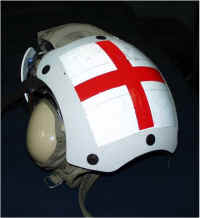
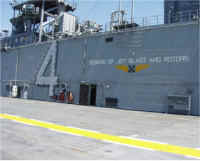 |
The flight deck covers 2.2 acres and is
designed to accommodate any helicopter in the U.S. inventory and AV8B
Harrier aircraft.
Up to 24 helicopters and 6 Harriers can be stored on the flight
deck.and flight deck personnel can control up to nine helicopters at one
time.
It is the most dangerous part of the entire ship. Only specially
trained and qualified personnel can be on the flight deck. Unless you hold
those qualifications, you will always be escorted by someone who does,
whenever it is necessary for you to be on the flight deck.
All flight deck personnel are identified by the color jacket and
markings of their helmet. This helmet with the red cross is for medical
personnel.
Entry to the medical spaces on the flight deck is through the double
doors. |
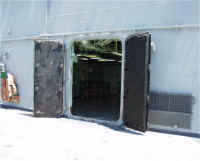 |
During flight operations, these doors are
normally closed.
That's good, because the flight deck is very noisy.
To receive casualties, the double doors are opened, allowing rapid
entry of ambulatory and litter patients into the medical stabilization
area. |
 |
The medical stabilization area is a large
space, surrounded by cabinets with medical supplies, and oxygen
tanks.
Tie-downs are built into the floor to allow patient litters or
equipment to be secured in heavy seas. Most of the time, that isn't
necessary, and litters are simply placed on litter stands. |
 |
IV's, bandages, and other medical equipment is
readily available in the cabinets along the walls.
An ice machine allows for rapid icing of traumatized tissues. |
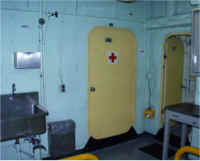 |
In the corner of the stabilizing area is the Battle
Dressing Station (BDS).
This is a small surgical area capable of serving several roles. |
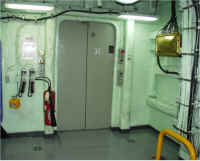 |
The elevator takes up to 6 litter patients
directly down to the Triage Area of the
Medical Department. |
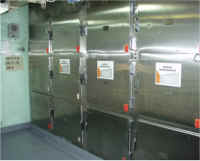 |
The ship's morgue is located just off the
stabilization spaces. |
|
Source:
Operational Medicine 2001, Health
Care in Military Settings, NAVMED P-5139, May 1, 2001, Bureau
of Medicine and Surgery, Department of the Navy, 2300 E Street NW, Washington,
D.C., 20372-5300 |
|
|
Military Obstetrics & Gynecology
This information is provided by
The Brookside Associates Medical Education Division. The Brookside
Associates, Ltd. is a private organization, not affiliated with any governmental
agency. The opinions presented here are those of the author and do not
necessarily represent the opinions of the Brookside Associates or the Department
of Defense. The presence of any advertising on these pages does not constitute
an endorsement of that product or service by either the US Department of Defense
or the Brookside Associates. All material presented here is unclassified.
C. 2009 All Rights
Reserved
Contact Us · Other Brookside
Products

|
|









